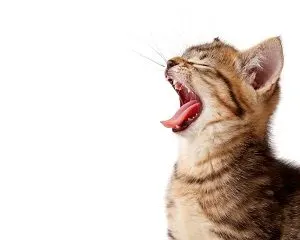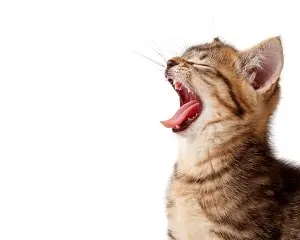 A cat gag can be a special kind of gross. It can also give a lot of information. When you put down a plate of food and a cat gags at it, there can be several causes. So, why do cats gag when they smell food?
A cat gag can be a special kind of gross. It can also give a lot of information. When you put down a plate of food and a cat gags at it, there can be several causes. So, why do cats gag when they smell food?
A cat gagging at the smell of its food can mean they’re grossed out by the flavor. It can also be a sign of underlying medical issues such as feline asthma or allergies. It’s essential to consider different factors when evaluating whether your cat needs to see a vet or needs a diet switch.
Cats have 65 million olfactories (smell) receptors, so there’s a good chance that the food is causing the gagging. Below, we’ll look at some reasons your kitty’s sense of smell may be telling them to send their food back to the kitchen!
Reasons For Gagging At Food
Cats can gag at the smell of food for many reasons. From simply not liking the scent itself to having an allergic reaction to the ingredients in it. Even things such as the texture of the food that is too soupy or too hard can cause this reaction. It’s very normal for cats to dry heave the minute something is not to their liking. They are sensitive animals when it comes to feeding.
Below is a list of common reasons your cat may be gagging at their food.
Not a fan
We’ll start with the most straightforward and most easily fixable reason that your cat might be gagging at their food: They may not like the smell. Cats’ vomeronasal sac, also known as the Jacobson’s organ, is part of a complex system connected to the feline’s ability to process smells. The organ is located in the upper part of the mouth. The cat grimaces at bad smells and uses their tongue to direct the smell to the back of their throat, making the gagging sound.
Giving your cat a new food that doesn’t smell right to them can cause this reaction. If it’s a new food by choice, it’s simple to pick something else. It may take some experimenting to see what cats’ favorite foods are, especially if you have a new cat. The more natural proteins included, such as tuna, chicken, or turkey, the more likely the cat will respond positively.
If it’s a prescribed food your cat doesn’t like, you can try mixing it with something yummy like tuna, experimenting with different temperatures, or adding flavor enhancers.
Cat foods should be made of at least 25% crude protein, though 30 or 35% is more advisable. Avoid ingredients like cornmeal, gluten, and byproducts that are bad for your cat and likely won’t be well-received.
Texture
Your cat food can have all the right ingredients and smells, but texture matters as well. Cat foods come in a variety of textures like pâté, sliced, grilled, minced, and many more. Cats have preferences as to how their food is presented because it affects how the food feels in their mouth and their ability to swallow it.
Your cat might like variety or may only want one flavor prepared one way, mainly if they are older or have issues with their teeth and gums. Gagging is your first clue that they don’t like the flavor or the texture of the meal.
More Complex Reasons For Gagging
What if you’re on a roll with your cat’s food satisfaction, and suddenly they start gagging? It could be that they’ve suddenly changed their preferences, but it could also be cause for concern.
Hairballs
All cats get hairballs due to their excessive grooming. They are more common in some cats than in others. Smelling their food, especially food with new odor, can activate the reflex in their throat and cause them to start hacking up the fur they’ve accumulated. Hairballs are normal within reason, but coughing them up every time they smell their food is not ideal. Time for a menu change!
Stomach troubles
Though not always a symptom of stomach issues, indigestion or acid reflux may be causing them to gag at overpowering smells. It is essential to take your cat to the vet as soon as possible. It’s important to remember that the diet that works for one cat won’t necessarily work for the other. Cats are all individual and there can underlying issues in how they digest the food that may make certain foods not work for them.
Bacterial infections
One very concerning reality is that cats can get bacterial infections, especially from food that it’s not properly prepared.
Clostridium perfringens is a bacteria common in raw or undercooked meat and poultry. It grows in an environment with little oxygen. An incorrectly processed can of cat food is therefore perfect breeding ground for the bacteria, and it can cause gagging, loss of appetite, nausea, and vomiting.
This happens less with processed foods though, and more with homemade foods. While it’s great to make your own cat food, you have to know what you’re doing and take very good care of the ingredients. The temperatures you serve the food at, proper preservation of the ingredients, and the levels of proteins and thickness of the food are all a factor.
Other Gagging Causes
Sometimes a cat will gag at the smell of food because of how it mixes with another flavor in the home. It’s essential to make sure your cat can eat in a clean environment. It’s highly recommended to set up their feeding location away from the litter box, and in a place where they won’t get sick by other elements.
Bad smells in the house
Cats’ sensitive noses aren’t reserved just for food. Smells like citrus, individual flowers, many spices, and several houseplants are very offensive to cats, and may trigger the gag reflex. Some of these scents are used to detract cats from spraying or clawing furniture. If you’ve recently used a spray or scent like this for behavior reasons and it causes gagging, know it may be working a little too well!
Obstructions in the throat
If your cat suddenly begins gagging and is also pawing at their mouth, drooling, or having trouble breathing, make sure there isn’t food or some other item your cat has ingested stuck in their throat. Cats that play with toys near their food, or may get scraps of cardboard from the scratching post in their food are particularly vulnerable.
There are steps here to help you when your cat is choking.
A gag-free environment
There’s a pretty decent chance that your cat’s gagging at their food is due to not wanting to eat it. But there can be other causes, and gagging is one of the more compelling ways a cat can tell you something is wrong. Look at their food patterns first before checking for other causes. As always, if you cannot figure out the issue and the gagging persists, it’s time for a trip to the vet!
When To Take Your Cat To The Vet For Gagging
Now, if you witness abnormal gagging (or repetitive) in your cat, then it may be time to take them to the vet. The vet will be able to diagnose your pet and offer remedies to solve the problem. Take in the following considerations before taking your cat to the vet. Here is what you should look for:
- Loud meowing (during and after gagging)
- Cat coughing up all of their food
- Abnormal cat waste coloration
- Repeated trips to the water bowl
- Debris in the nasal passage
- Dry cough (this could be feline asthma)
- Visible obstructions in the food bowl that your cat has ingested
Of all the points listed above, the most concerning are abnormal waste coloration, dry cough, or items in the food bowl that your cat should have not consumed. Dry cough is the toughest to diagnose, because it might just be more than a hairball. Cats who are coughing after drinking water or eating food may have some form of feline asthma.
Conclusion

My name is James, and welcome to FAQCats!
Along with our team of cat owners, expert pet enthusiasts, and pet professionals, we aim to write engaging helpful, engaging content about cats. At FAQCats we strive to provide content that’s accurate and fun to read. Our team writes about everything related to cats; even the most complex of topics. Through extensive research and caring for our own fur-pals, we’re able to provide something cat owners worldwide will love. Have a look around, and leave us feedback anytime!

